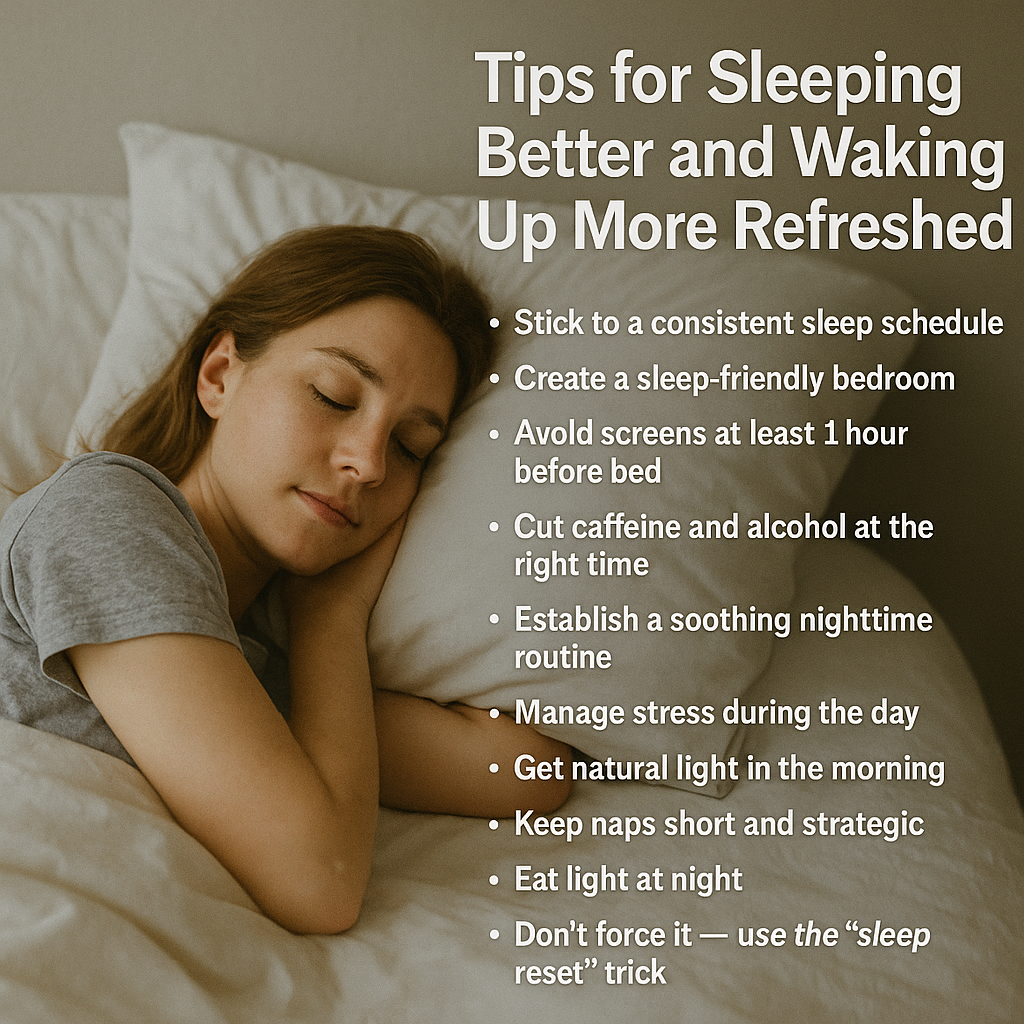Sleep isn’t a luxury—it’s a biological necessity. Yet, millions of people struggle to get consistent, restful sleep and wake up feeling groggy or drained. If you’ve ever hit snooze five times in a row or spent the night tossing and turning, you’re not alone.
The good news? Small changes to your daily habits and nighttime routine can lead to big improvements in your sleep quality—and help you wake up feeling energized and ready to take on the day.
In this article, we’ll explore proven tips to help you fall asleep faster, sleep more deeply, and wake up refreshed—no matter how busy your schedule is.
Why Good Sleep Matters
Sleep affects nearly every aspect of your health. During deep sleep, your body and brain undergo crucial repair and recovery processes. Without it, everything from your mood to your immune system suffers.
Benefits of quality sleep include:
- Better concentration and memory
- Lower stress and anxiety levels
- Improved mood and emotional stability
- Stronger immune function
- Increased energy and productivity
Getting enough restful sleep (not just hours in bed) is essential for your physical and emotional well-being.
1. Stick to a Consistent Sleep Schedule
Your body has an internal clock called the circadian rhythm. When you go to bed and wake up at the same time every day (yes, even on weekends), you reinforce this rhythm and fall asleep faster.
Action steps:
- Choose a regular bedtime and wake-up time—stick to it within 30 minutes daily.
- Avoid sleeping in late, even on days off.
- Start winding down 30–60 minutes before bed to signal your body it’s time to rest.
Consistency is more powerful than trying to “catch up” on sleep later.
2. Create a Sleep-Friendly Bedroom
Your environment matters more than you think. Even small distractions or discomforts can prevent deep sleep.
Optimize your bedroom:
- Darkness: Use blackout curtains or an eye mask.
- Silence: Try earplugs or a white noise machine.
- Cool temperature: The ideal range is 60–67°F (15–19°C).
- Comfortable bedding: Invest in a quality pillow and mattress.
Bonus tip: Reserve your bed for sleep and intimacy only. Avoid working, eating, or watching TV in bed.
3. Avoid Screens at Least 1 Hour Before Bed
The blue light from phones, tablets, and computers interferes with melatonin—the hormone that helps you fall asleep.
What to do instead:
- Read a physical book
- Listen to calming music or a sleep podcast
- Practice light stretching or meditation
- Journal or write a to-do list for tomorrow
Dimming lights and avoiding screens helps your brain prepare for rest.
4. Cut Caffeine and Alcohol at the Right Time
Caffeine can stay in your system for 6–8 hours and disrupt sleep—even if you don’t feel jittery. Alcohol might make you sleepy, but it reduces sleep quality and causes more awakenings during the night.
Guidelines:
- Avoid caffeine after 2:00 PM
- Limit alcohol to early evening (or skip it entirely)
- Drink water or herbal tea (like chamomile) at night
Replacing stimulants with calming rituals makes a big difference.
5. Establish a Soothing Nighttime Routine
A calming routine signals to your brain that it’s time to unwind. This makes the transition from wakefulness to sleep much smoother.
Ideas for a healthy bedtime routine:
- Take a warm shower
- Apply lavender oil or lotion
- Light a candle or dim the lights
- Do a simple breathing exercise
- Sip a small cup of herbal tea
The key is consistency and choosing activities that relax your body and mind.
6. Manage Stress During the Day
Stress doesn’t turn off at night—it follows you to bed. The more you process and manage it during the day, the easier it is to relax later.
Try this:
- Write down your worries before bed (a “worry dump”)
- Practice mindfulness or gratitude during the day
- Avoid heavy conversations or decision-making right before sleep
Reducing mental clutter helps you fall asleep with a clearer mind.
7. Get Natural Light in the Morning
Morning sunlight helps regulate your circadian rhythm and improves melatonin production for the night ahead.
Steps:
- Spend 15–30 minutes outside in the morning
- Open your curtains first thing after waking
- If natural light is limited, consider using a light therapy lamp
A strong start in the morning leads to a smoother sleep at night.
8. Keep Naps Short and Strategic
Napping can be beneficial, but it’s important to time it right.
Nap guidelines:
- Keep naps under 30 minutes
- Avoid napping after 3:00 PM
- Use naps as a quick energy boost, not a replacement for nighttime sleep
Done correctly, naps can enhance alertness and mood.
9. Eat Light at Night
Heavy meals close to bedtime can disrupt digestion and make it harder to sleep.
Tips:
- Eat dinner 2–3 hours before bed
- Avoid spicy, rich, or fatty foods late at night
- If you need a snack, try a banana, oatmeal, or a handful of almonds
Eating light in the evening supports better sleep quality.
10. Don’t Force It—Use the “Sleep Reset” Trick
If you can’t fall asleep after 20–30 minutes, get out of bed and do a calming activity (reading, stretching) until you feel sleepy again.
Lying in bed frustrated reinforces negative associations with sleep. Reset your brain and try again.
Final Thoughts: Sleep Better, Live Better
Better sleep doesn’t require an overnight overhaul—just small, intentional changes. By adjusting your habits, setting the stage for rest, and managing stress, you’ll improve not only your sleep, but also your mood, energy, and overall well-being.
Your body wants to rest. Your brain needs to reset. Give yourself the gift of true rest—and start waking up to a healthier, happier life.

